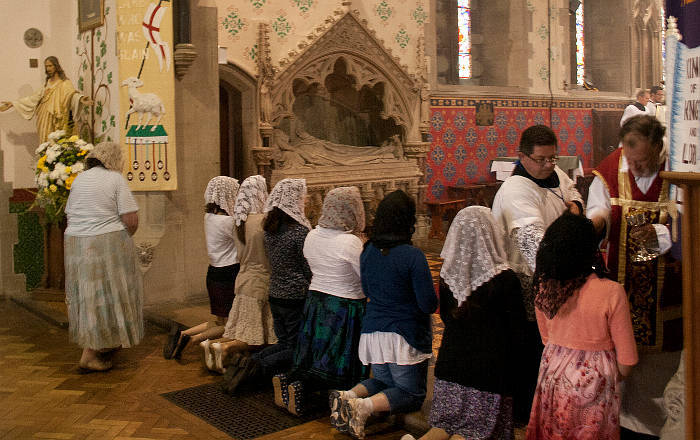
Hos Rorate Cæli fikk jeg tips om et nytt dokument om liturgien fra engelske Latin Mass Society. Dette siste dokumentet i denne serien argumenterer for at en tre timers faste før mottagelsen av kommunion bør gjeninnføres – og jeg syns nok argumentene har noe for seg. (Inntil 1953/-57 var det i over 1000 år obligatorisk faste fra midnatt før kommunion, så ble dette redusert til tre timer, og på 60-tallet til bare én time – noe som i prasis er nesten ingen ting.)
I dokumentet leser vi bl.a.:
On this topic, and on the topic of Holy Days of Obligation, which we will be dealing with in the future, Catholics attending the Traditional Mass are governed by Canon Law, and the provisions of their local bishops, which have changed the legal structure the liturgy works within. The Canon legal situation in 1962 was that we were obliged to fast for three hours before receiving Communion (see Appendix B for the full details); a few years earlier, we had been obliged to fast from Midnight. The seriousness the midnight fast, and even the three hour fast, implied about the reception of Holy Communion, accorded with the seriousness implied by the ancient liturgy itself. These fasts were something which Catholics intending to receive Holy Communion had to think about; every now and then people would not receive Communion because it was not practical to observe the fast, that is, to give the Blessed Sacrament the honour which is its due. (Although, in fact, the exceptions to the three-hour fast after 1957 were extremely generous: see Appendix C.)
By contrast – and I think I can say this without offending anyone – the one-hour fast is not serious. The motivation for it is obvious enough, to make things easier for the Faithful, but it no longer tells us that the reception of Holy Communion is something to be prepared for with care, and undertaken with fear and trembling. It does not accord with the seriousness implied by the ancient Mass.
Since the decision has been taken by the Holy Father to treat the Traditional Latin Mass, from a legal point of view, as a ‘form’ of the same Rite as the Novus Ordo, rather than as a separate Rite, it does not make sense to argue for a different, binding discipline for the Eucharistic Fast for Catholics attending the TLM, than for Catholics attending the Novus Ordo. Within this context, we must argue for a revision of the discipline for all Catholics of the Latin Rite. And it seems to us that this is an opportune moment to do just that.
